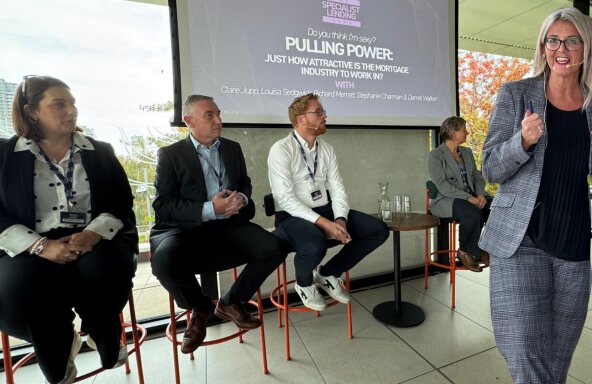The UK mortgage industry must work harder to attract new talent if it is to secure its long-term future, senior executives warned yesterday at the Brightstar Group’s Lender Expo in Stratford, London.
Speaking at a panel debate (main picture) provocatively titled ‘Do you think I’m sexy?’, industry leaders admitted that the sector’s image remains a barrier to younger recruits – despite efforts to improve diversity and broaden entry routes.
Clare Jupp, chief people officer at Brightstar Group, chaired the session and asked panellists to reflect on their own journeys into financial services. None, it transpired, had intended to build a career in mortgages.
ROYAL FAIL
Richard Merrett, managing director of Alexander Hall, joked: “I came out of university with an English degree and said there were two things I wasn’t going to do – sales and financial services. So I failed royally. I wanted to go into journalism, writing about football. Instead, here I am 22 years later.”
For Louisa Sedgwick, managing director of mortgages at Paragon Bank, the path was equally unplanned.
“I wanted to be a policewoman, but I wasn’t tall enough. After being made redundant from a travel agency, I joined Bradford & Bingley on a temporary mortgage admin contract. That was 33 years ago – and I’ve never left [the industry].”
FANTASY FOOTBALL
Darrell Walker, group sales director at Chetwood Bank, recalled abandoning football ambitions under parental pressure to pursue “a white-collar career” at NatWest, where he joined a management training scheme at 16.
“Mortgages were never on the agenda – but 34 years later I’m still here,” he said.
FATAL ATTRACTION
The discussion turned to the industry’s broader challenge: how to make financial services attractive to younger generations. A recent BBC Bitesize survey of teenagers ranked the NHS and Tesla among the most desirable employers. Financial services did not feature.
“We don’t tell them,” Sedgwick admitted. “It’s never been sexified. My 19-year-old thinks my job sounds dull – and maybe that’s how it looks from the outside. But the truth is, this is a dynamic, rewarding industry.”
Walker argued that the sector had failed to maintain the prestige banking once enjoyed.
“When I was young, being a bank manager had kudos. There was a pathway, training and qualifications. Now banks are shutting branches and kids aren’t taught about finance in school. They don’t see the opportunities.”
MORTGAGE MISCONCEPTIONS
Stephanie Charman, chief executive of the Association of Mortgage Intermediaries, added that misconceptions deter young people.
“When we spoke to Nottingham University students, most didn’t even know mortgage advice existed as a career.
“Some assumed you needed the same qualifications as accountants or lawyers. Others see redundancies in banking and worry about stability. Add fears around AI replacing jobs, and you can see why it isn’t top of their list.”
MAKING DREAMS COME TRUE
Yet panellists were united that the work itself carries strong appeal.
“We make people’s dreams come true,” Merrett said. “Homeownership is fundamentally important – and we’re there to protect people at their worst moments too. Purpose is the real pulling power.”
All agreed that apprenticeships, outreach to schools, and modernising qualifications would be vital.
RECRUITMENT DRIVE
Sedgwick pointed to Paragon’s recruitment drive: “We’ve taken on 20 apprentices in three years, run mentoring schemes, and worked with schools on tech initiatives. But geography limits us. National coordination would help.”
Charman added: “We need to showcase the variety of roles – from advice to technology to compliance. There are so many routes in. The challenge is making sure young people see them.”
Main picture: (Left to right) Stepahanie Charman, chief executive of the Association of Mortgage Intermediaries; Darrell Walker, group sales director at Chetwood Bank; Richard Merrett, managing director of Alexander Hall; Louisa Sedgwick, managing director mortgages at Paragon Bank and (inset) Clare Jupp, chief people officer, Brightstar Group.



